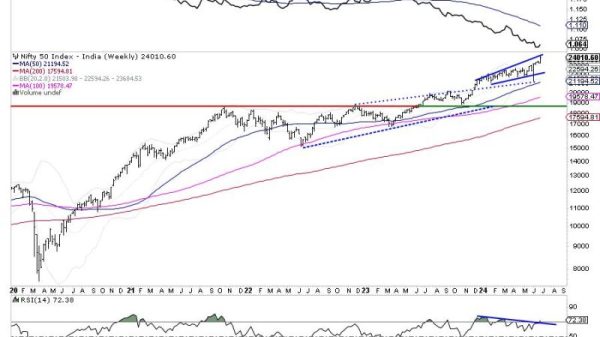
Investing in the stock market can be intimidating, especially if you’re a beginner. But the right strategy can both protect your money while helping you build wealth that lasts a lifetime.
Buying individual stocks may be one of the most common ways to invest, but it’s not for everyone. This approach is a major time commitment, requiring hours of research to determine the appropriate stocks for your portfolio. It can also be incredibly expensive to get started, as you’ll need to buy at least 20 to 30 stocks for a well-diversified portfolio.
Fortunately, there’s a simpler strategy that can help you make a lot of money in the stock market with minimal effort: investing in low-cost index funds.
What are index funds?
An index fund is a collection of stocks that tracks a particular stock market index. An S&P 500 index fund, for example, follows the S&P 500 (^GSPC 0.16%) — meaning it includes all of the stocks within the index and aims to mirror its performance.
There are also funds that track smaller, more niche indexes if you’re looking to gain exposure to a particular area of the market. Some indexes track specific industries, for example, while others focus on subsets of companies like international stocks or small-cap stocks.
By investing in index funds, you can easily invest in the stock market with a fraction of the research involved in buying individual stocks. Whether you’re crunched for time or simply want a no-fuss investment that requires minimal effort, index funds can be a fantastic choice.
Index funds come with major advantages
Besides being a lower-effort investment, there are some major advantages to investing in index funds:
They provide instant diversification: Each index fund may contain hundreds of stocks, which can instantly diversify your portfolio. For example, an S&P 500 index fund includes stocks from 500 companies across a wide variety of industries, which can significantly lower your risk — especially during periods of volatility.They’re lower cost: Because index funds simply follow particular indexes, they are passive investments — unlike actively managed mutual funds, which have a professional choosing the stocks within the fund. Passive investments tend to have much lower fees than actively managed funds, which could save you thousands of dollars over time.They’re beginner-friendly: If you’re just getting started investing, index funds are a fantastic option for limiting your risk while getting involved in the stock market. Say, for example, you want to invest in the tech industry but aren’t sure where to start. Investing in an index fund that tracks the tech sector can give you exposure to that industry without having to spend hours researching individual stocks.
Whether you’re looking to invest broadly in funds that track the stock market as a whole or you want a more specific investment to gain exposure to more niche industries, there’s an index fund out there to meet your needs. And with the right strategy, you could earn more than you might think.
How much can you earn with index funds?
Exactly how much you might earn will depend on where, specifically, you choose to invest. Each index contains a different variety of stocks, which will affect the fund’s performance.
Broad-market funds, such as S&P 500 index funds, often experience lower returns over time, but they’re also safer than many other investments. The market itself has a perfect history of earning positive returns over decades, and this type of index fund is about as close as you can get to guaranteed gains.
More niche index funds, like industry-specific funds, carry more risk — at least partly because they’re not as diversified as broad-market funds. However, they also have the potential for much higher-than-average returns. Whether that’s a risk you’re willing to take will depend on your personal preferences and goals.
That said, even average returns can help you make a lot of money over time. The market as a whole has earned an average rate of return of around 10% per year, historically. If you were to invest, say, $200 per month in an index fund earning 10% average annual returns, here’s approximately how that would add up over decades:
Data source: Author’s calculations via investor.gov.
With enough time and consistency, it’s possible to build a million-dollar portfolio with index funds. If you’re able to invest more per month, you could earn well over $1 million after a few decades.
Investing in index funds can be a fantastic way to build wealth with minimal effort. By investing consistently and keeping a long-term outlook, you could easily generate hundreds of thousands of dollars or more over time.




























